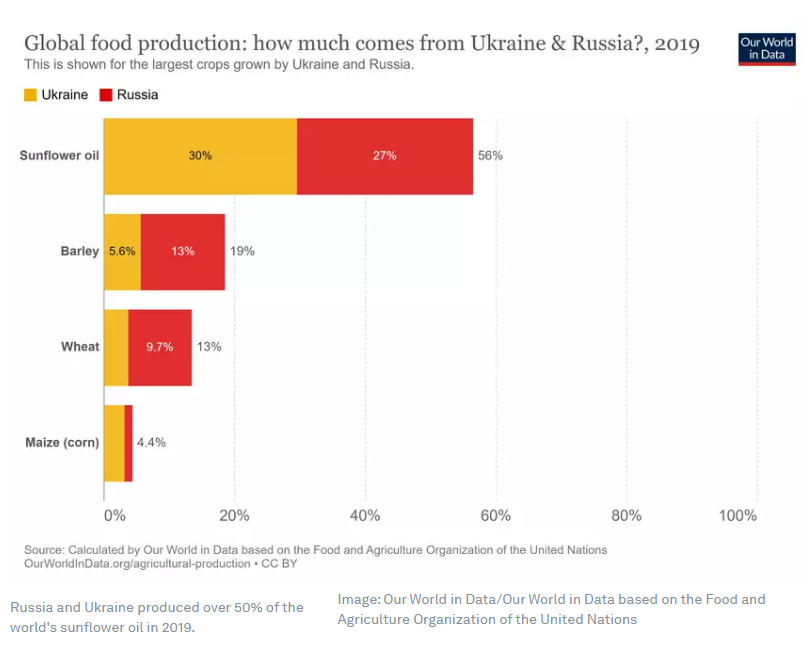by Hannah Ritchie*
Ukraine has been one of the world’s largest contributors to the World Food Programme – the UN agency that provides food aid to countries in crisis. The Head of the WFP – David Beasley estimates that it provides 40% of its wheat.
The war has now reversed this flow: the WFP is now working to provide Ukrainians with the supplies they need in this crisis.
The war in Ukraine could have profound impacts on global food supplies, with far-reaching consequences for hunger and food security across the world. But it doesn’t have to – there is time to react and to contain a larger crisis.
In this article, I present the data we need to understand the scale of their contribution, and which countries are most reliant on Ukraine for their food supplies.
Ukraine and Russia are among the world’s largest exporters of cereal crops and oils
Ukraine and Russia both play a major role in global food markets. They are net exports of several of the leading cereal crops: wheat, maize (corn), and barley. Both are also dominant exporters of sunflower oil, one of the world’s dominant vegetable oils. Some countries – such as India – rely heavily on imports of sunflower oil for domestic food supplies.
In the charts I show their contribution to global food exports (how much is traded between countries); and global food production.
The charts show that in 2019 around one-quarter of global wheat exports come from Ukraine and Russia. One-fifth of global maize, and barley too. They are the source of nearly two-thirds of traded sunflower oil, with Ukraine alone accounting for almost half of global exports.


Which countries are most reliant on food imports from Ukraine and Russia?
The potential impacts of reduced food outputs from Ukraine and Russia will not be felt equally everywhere. Some of the most vulnerable are countries that import directly from these countries.
But it will not be contained to these direct importers. Food prices are rising, which means that all countries that are net importers of these commodities could feel significant impacts.
To identify the countries that are most vulnerable – and might need assistance in the months ahead – I have brought together country-by-country import data from these key crops. In the data explorer below you can see the global situation for a range of commodities and metrics.
You can see which countries import the most wheat, maize, barley or sunflower oil; which countries import from Ukraine and/or Russia; and how dependent they were on imports for the domestic supply.
We can see, for example, that many countries across the Middle East and North Africa rely heavily on wheat imports from Ukraine and Russia; they supply more than two-thirds of imports in Egypt, Libya and Lebanon. For maize, the reliance on Ukraine and Russia has a larger geographical reach with countries across East Asia and Europe also importing a large share from them.
To maintain consistency between production, domestic supply and import metrics I have sourced all of the underlying data for these calculations from the UN Food and Agriculture Organization.
*Researcher, Our World in Data
**first published in: www.weforum.org




 By: N. Peter Kramer
By: N. Peter Kramer
